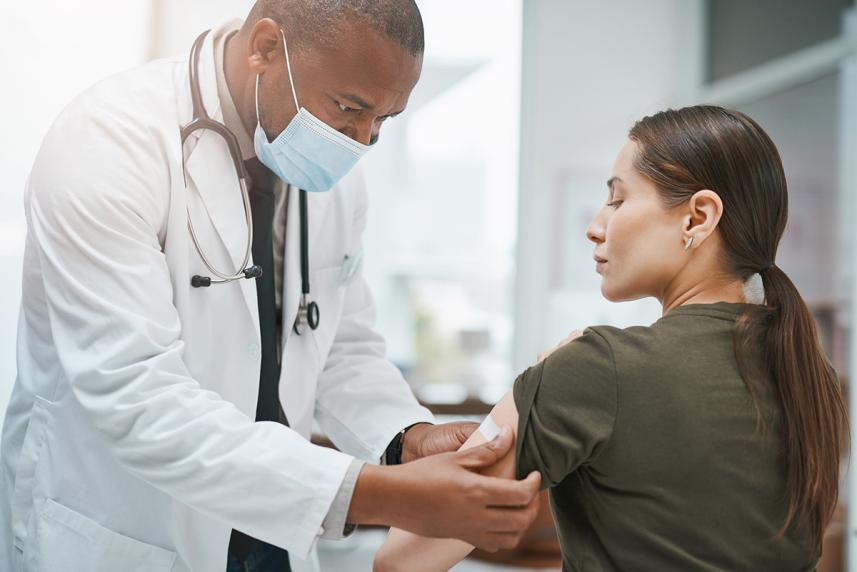What’s new with COVID vaccines?
The contagious respiratory virus is still around and still evolving. Here’s what you need to know to protect yourself.

COVID isn’t going away. After summer cases clear up, we’re now heading into the fall and winter season, when respiratory viruses tend to circulate widely in our communities.
“COVID looks like it’s here to say. It’s a virus that we’re going to have to live with,” says Delana Wardlaw, M.D., a family medicine doctor associated with Fair Hill Community Physicians, part of Temple Health in Philadelphia.
That’s why it’s essential to prepare for potential winter surges, regardless of your health background. Here’s what you need to know based on your risk level.
If you’re 65 or older
Make sure you get an updated COVID vaccine this fall. Older adults have a higher risk of developing severe COVID due to the natural decline in immune system function with age. Most deaths from the virus occur in people over age 65, and the COVID mortality rate in this age group is 97 times higher than in younger adults. If you live in a long-term care facility, your risk is even greater.
If you’re a healthy adult
Even if you’re generally in good health, you should still receive the updated COVID vaccine this fall. The virus keeps changing, and the protection from your earlier vaccines can fade over time.
“This fall, we will have a new formula of the COVID vaccine that will protect us against some of the newer mutations,” says Lawrence L. Livornese, Jr., M.D., an infectious disease doctor at Main Line Health in Wynnewood, Pennsylvania. You can receive your COVID and flu vaccinations during the same visit, the perfect one-two punch against respiratory viruses this season.
If you’re an adult at high risk of severe COVID
The more underlying medical conditions you have, the greater your risk of severe illness from COVID at any age. This includes conditions like:
- Cancer
- Chronic kidney disease
- Chronic liver disease
- Chronic lung disease (including moderate to severe asthma or chronic obstructive pulmonary disease)
- Cystic fibrosis
- Diabetes
- Heart conditions
- Obesity
Like other adults, you’re encouraged to receive the updated vaccine this fall. If you test positive for COVID, contact your doctor right away. If you’re someone at higher risk of severe complications, including hospitalization, you may be eligible for antiviral medication, says Dr. Livornese.
“We encourage patients to have a conversation with their clinician about whether these medications would be beneficial for them, as well as to develop a plan for what to do if their symptoms worsen,” he says. Antivirals need to be taken within five to seven days of the onset of symptoms, so don’t delay in reaching out to your provider.
According to the Centers for Disease Control and Prevention, COVID symptoms include:
- Fever or chills
- Cough
- Shortness of breath or difficulty breathing
- Sore throat
- Congestion or runny nose
- New loss of taste or smell
- Fatigue
- Muscle or body aches
- Headache
If you’re a parent or grandparent of children
Children ages 6 months and older should get the COVID vaccine as well, especially if they have underlying health conditions. The vaccine is safe for children and helps keep them healthy, reducing the likelihood of them missing school. They should receive the updated vaccine even if they’ve had COVID or been vaccinated before. If they do contract COVID, children who are vaccinated usually experience milder symptoms that can be treated at home.
However, if you notice any red flag symptoms, seek emergency care immediately. This includes symptoms such as:
- A bluish tint to their lips or face
- Chest pain
- Dehydration
- Difficulty breathing
- Fever above 100.4 degrees that doesn’t come down after treating it with medication
- Lack of alertness
With various viruses in circulation, the winter season can be a challenge, so don’t hesitate to call their pediatrician with any concerns.
Taking steps to protect yourself from COVID can help keep you and your loved ones safe this season. To get your COVID vaccination, find an in-network doctor, retail health clinic, or pharmacy location. And while you’re there, consider getting vaccinated against the flu, too. You can receive both vaccinations during the same visit or separately.


